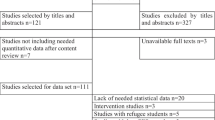Abstract
There is mixed evidence in the existing literature on whether children are associated with greater subjective well-being, with the correlation depending on which countries and populations are considered. We here provide a systematic analysis of this question based on three different datasets: two cross-national and one national panel. We show that the association between children and subjective well-being is positive only in developed countries, and for those who become parents after the age of 30 and who have higher income. We also provide evidence of a positive selection into parenthood, whereby happier individuals are more likely to have children.





Similar content being viewed by others
Notes
A number of high-GDP countries appear below the fitted line. Dropping the top 5 % countries by GDP leads to a fitted line that is steeper and more significant, reinforcing our conclusion that the correlation between children and subjective well-being is more positive in richer countries. Without these high-GDP countries, the relationship between children and well-being turns positive at a GDP level of around 15,000 dollars. We investigate again the possibility of an inverted U-shape and find that the coefficient of GDP-squared is negative and significant at the 1 % level. The GDP threshold to obtain a positive relationship between children and the Cantril ladder now stands at 10,000 dollars..
Latin America, the Middle East, Africa, South-East Asia, South Asia, and East Asia except Japan, South Korea, Singapore and Israel.
European Union, Iceland, Norway, Switzerland, Cyprus, US, Canada, Japan, South Korea, Singapore, Israel, Australia and New Zealand.
References
Aassve, A., Goisis, A., & Sironi, M. (2012). Happiness and childbearing across Europe. Social Indicators Research, 108(1), 65–86.
Aassve, L., Mencarini, M., & Sironi, M. (2015). Institutional change, happiness and fertility. European Sociological Review, 31(6), 749–765.
Alesina, A., Di Tella, R., & MacCulloch, R. (2004). Inequality and happiness: Are Europeans and Americans different? Journal of Public Economics, 88(9), 2009–2042.
Baetschmann G., Staub K. E., & Studer R. (2012). Does the stork deliver happiness? Parenthood and life satisfaction. Working Paper Series (University of Zurich, Zurich).
Balbo, N., & Arpino, B. (forthcoming). The role of family orientations in shaping the effect of fertility on subjective well-being. Demography.
Billari, F. C. (2009). The happiness commonality: Fertility decisions in low-fertility settings. How generations and gender shape demographic change (pp. 7–38). United Nations Publications.
Buddelmeyer, H., Hamermesh, D. S., & Wooden, M. (2015). The stress cost of children. Melbourne Institute Working Paper No. 1/15.
Clark, A. E., Diener, E., Georgellis, Y., & Lucas, R. E. (2008). Lags and leads in life satisfaction: A test of the baseline hypothesis. Economic Journal, 118(529), F222–F243.
Deaton, A., & Stone, A. A. (2014). Evaluative and hedonic well-being among those with and without children at home. Proceedings of the National Academy of Sciences, 111(4), 1328–1333.
Evenson, R. J., & Simon, R. W. (2005). Clarifying the relationship between parenthood and depression. Journal of Health and Social Behavior, 46(4), 341–358.
Hansen, T., Slagsvold, B., & Moum, T. (2009). Childlessness and psychological well-being in midlife and old age: An examination of parental status effects across a range of outcomes. Social Indicators Research, 94(2), 343–362.
Herbst, C., & Ifcher, J. (2012). A bundle of joy: Does parenting really make us miserable?. Available at SSRN 1883839.
Kahneman, D., Krueger, A. B., Schkade, D. A., Schwarz, N., & Stone, A. A. (2004). A survey method for characterizing daily life experience: The day reconstruction method. Science, 306(5702), 1776–1780.
Le Moglie, M., Mencarini, L., & Rapallini, C. (2015). Is it just a matter of personality? On the role of subjective well-being in childbearing behavior. Journal of Economic Behavior & Organization, 117, 453–475.
Margolis, R., & Myrskylä, M. (2011). A global perspective on happiness and fertility. Population and Development Review, 37(1), 29–56.
McLanahan, S., & Adams, J. (1987). Parenthood and psychological well-being. Annual Review of Sociology, 13, 237–257.
Myrskylä, M., Kohler, H., & Bilari, F. (2009). Advances in development reverse fertility declines. Nature, 460(7256), 741–743.
Myrskylä, M., & Margolis, R. (2014). Happiness: Before and after the kids. Demography, 51(5), 1843–1866.
Nelson, S. K., Kushlev, K., English, T., Dunn, E. W., & Lyubomirsky, S. (2013). In defense of parenthood: Children are associated with more joy than misery. Psychological Science, 24(1), 3–10.
Parr, N. (2010). Satisfaction with life as an antecedent of fertility: Partner + Happiness = Children? Demographic Research, 22(21), 635–661.
Rollins, B. C., & Cannon, K. L. (1974). Marital satisfaction over the family life cycle: A reevaluation. Journal of Marriage and the Family, 36(2), 271–282.
Rollins, B. C., & Feldman, H. (1970). Marital satisfaction over the family life cycle. Journal of Marriage and the Family, 32(1), 20–28.
Stanca, L. (2012). Suffer the little children: Measuring the effects of parenthood on well-being worldwide. Journal of Economic Behavior & Organization, 81(3), 742–750.
Stutzer, A., & Frey, B. S. (2006). Does marriage make people happy, or do happy people get married? The Journal of Socio-Economics, 35(2), 326–347.
Umberson, D., & Williams, K. (1999). Family status and mental health. In C. Aneshensel & J. Phelan (Eds.), Handbook of the sociology of mental health (pp. 225–253). New York: Springer.
Acknowledgments
We are very grateful to Letizia Mencarini for encouragement and Romina Boarini for help with the data. Three anonymous referees provided extremely helpful comments that helped us make our arguments clearer. We thank CEPREMAP for financial support as well as the French National Research Agency, through the program Investissements d’Avenir, ANR-10-LABX_93-01. Support from CEPREMAP, the US National Institute on Aging (Grant R01AG040640), the John Templeton Foundation and the What Works Centre for Wellbeing is gratefully acknowledged.
Author information
Authors and Affiliations
Corresponding author
Appendix
Appendix
See Tables 6, 7, 8, 9, 10, 11, 12, 13, 14 and 15.
Rights and permissions
About this article
Cite this article
Cetre, S., Clark, A.E. & Senik, C. Happy People Have Children: Choice and Self-Selection into Parenthood. Eur J Population 32, 445–473 (2016). https://doi.org/10.1007/s10680-016-9389-x
Published:
Issue Date:
DOI: https://doi.org/10.1007/s10680-016-9389-x




